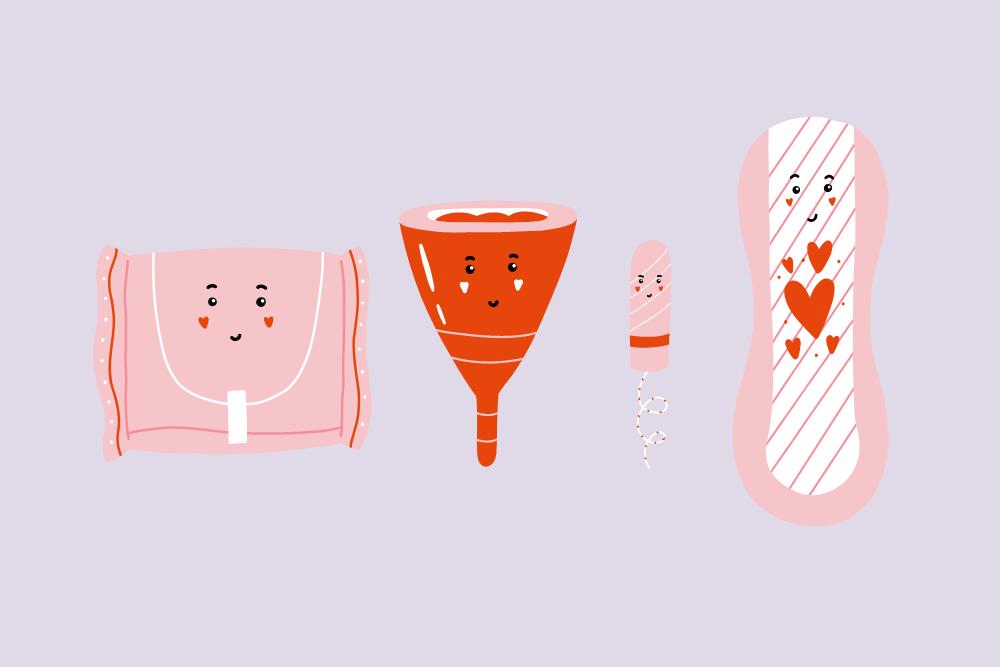When it comes to work, most of us have faced those days when all we want to do is curl up with a warm blanket and a hot cup of tea. And if you’re a woman, there’s a high chance these days may coincide with the period pain of your menstrual cycle . But what if we told you there’s a growing conversation in Australia about a unique type of leave that acknowledges these challenging days and gives women the chance to take paid time off during their periods? Yes, you read that right – it’s called menstrual leave.
Menstrual Leave: Embracing the Monthly Challenge
Imagine a workplace where your boss understands that your monthly visitor can be a bit of a hassle – the period cramps , mood swings, and fatigue. Well, that’s the idea behind menstrual leave in Australia. This concept recognises that periods can be tough for many women and aims to provide a supportive work environment by allowing them to take time off without guilt or stress. It’s not widespread yet, but some Australian companies are taking the lead by including paid menstrual leave in their benefits package.
Look after your reproductive health with Youly! »The Backstory: From Hush-Hush to Open Discussion
This discourse surrounding paid menstrual leave didn’t just pop up overnight. It’s part of a journey that began when people started acknowledging women’s health in the workplace . In the past, talking about periods was like tiptoeing around an uncomfortable topic. But as society evolved and people became more aware of the challenges of menstruation (like the severe period pain many women face monthly), the conversation gained momentum.
The advocacy efforts and the changing perceptions about workplace equality played a pivotal role in sparking this dialogue. Women began sharing their experiences and challenges, gradually breaking down the barriers of discussing something considered taboo for too long. This shift marked the start of a broader change in how workplaces perceive and respond to the holistic needs of their employees.

The Changing Landscape: How Workplaces Are Adapting
Picture this: a workplace where conversations about periods aren’t hushed whispers but open discussions. This transformation is happening in various workplaces across Australia. Companies are beginning to understand the importance of menstrual well-being and its impact on employee satisfaction and overall productivity.
So, how are they making menstrual leave happen?
Initiating Open Conversations
Forward-thinking workplaces are taking the first step by creating an environment where employees can comfortably talk about painful periods and menstrual health without fearing judgement. This cultural shift encourages empathy and understanding among colleagues, creating a more compassionate work atmosphere.
Trying Out New Policies
In a bid to stay ahead of the curve, some progressive companies are introducing period leave policies. These policies allow women to take paid time off when their periods are causing discomfort. The specifics can vary – from the number of days allowed to the process of requesting leave. By taking this step, companies show commitment to employee well-being and inclusivity.
Balancing Law and Ethics
As the conversation around period leave gains traction, balancing legal requirements and ethical responsibilities is a key consideration. While there might not be a one-size-fits-all law for period leave in Australia, existing workplace laws often cover health-related concerns. Companies might offer paid sick leave or personal leave that can be used to manage health challenges, including menstruation.
Fostering an Inclusive Culture
Ethical dimensions come into play when we think about treating employees fairly. Discrimination or negative attitudes towards those taking period leave can go against workplace equality principles. Transparent policies that ensure equal treatment and protection from bias are crucial. Educating employees and management about menstrual well-being is a significant step towards creating an inclusive work environment.
Different Approaches in Different Companies
When it comes to period leave, there’s no universal formula that suits every company. Companies are getting creative with their approaches. Imagine this: some companies set a specific number of days off for periods, while others offer flexible personal leave that can be used as needed. This flexibility means employees can adjust their work arrangements to work from home instead of the office when they have period pain or bloating , to manage their menstrual health better. The number of days off varies, too, as companies adjust their policies to fit their unique work culture and what their employees truly need. It’s all about finding the perfect fit for each workplace while putting the well-being of employees first.
Pioneering the Way: Australian Companies with Menstrual Leave
In the landscape of evolving workplace practices, a few standout companies have embraced the concept of menstrual leave. Future Super , a company known for its progressive policies, has taken a step forward by incorporating menstrual leave into its benefits package. This move reflects their commitment to prioritising the well-being of their employees.
Another notable player is Modibodi , a company recognised for its innovative, eco-friendly period underwear. Not only have they advocated for menstrual leave, but they’ve also extended benefits related to menstrual and menopausal health to their employees. These companies are leading the charge, recognising the significance of menstrual health and creating a work environment that values the diverse needs of their workforce.
The Pros and Cons: Weighing the Impacts
As with any innovative concept, the introduction of period leave has sparked enthusiastic support and critical evaluation. Advocates stand firm on the positive impacts, emphasising the potential enhancement of well-being and productivity among female employees. In reality, navigating a demanding work environment while grappling with cramps and mood swings isn’t a walk in the park. The availability of period leave presents an opportunity for individuals to unapologetically prioritise their self-care, recharge, and then return to work more focused and revitalised.
On the flip side, concerns are brewing about the logistics of managing workloads and the potential for disruptions when employees take time off for menstrual reasons. It’s an intricate task to strike a balance between addressing individual needs and meeting the consistent demands of a workplace, particularly in roles where continuous presence is vital.
The apprehension is that accommodating period leave could inadvertently lead to shifts in work dynamics, affecting project timelines and placing extra pressure on colleagues covering for absent team members. In this tussle between individual well-being and operational efficiency, workplaces face the challenge of finding equilibrium.
A Cultural Shift: Destigmatising Menstrual Health
The discussion around period leave mirrors a broader shift in societal attitudes – one that’s dismantling long-held taboos and ushering in a new era of open conversations about menstruation. As workplaces and individuals begin to discuss menstrual health openly, they’re not just breaking the silence; they’re normalising a topic historically enveloped in secrecy and discomfort. This evolution towards candid dialogue embodies a culture embracing inclusivity and empathy.
The conversations about period leave contribute to destigmatising the challenges women have quietly navigated for generations. No longer confined to hushed conversations, these discussions foster an environment where menstrual experiences are acknowledged without embarrassment. This cultural shift paves the way for employees to prioritise their well-being without hesitation or fear of judgement. It’s about recognising that menstrual challenges are a shared human experience and that workplaces can be spaces where empathy and understanding flourish. As the shackles of stigma continue to break, workplaces become nurturing environments where individuals can openly care for themselves, leading to a more balanced and harmonious work-life situation.

Global Insights: Looking Beyond Australia
The discussion around menstrual leave extends far beyond Australia’s borders, resonating on a global scale. Nations like Japan, South Korea, and Italy have taken progressive steps to incorporate similar concepts into their workplaces, with some countries formalising it through legal frameworks or corporate policies.
Australia can glean valuable lessons and innovative ideas to sculpt its unique path forward by examining how different cultures and societies have tackled the issue. This global exploration not only informs policy-making but also underscores the universality of the need for workplaces that cater to the holistic well-being of all employees.
Making Menstrual Leave Work: Practical Steps for Success
Implementing period leave requires careful planning. Here are some tips for creating a successful policy:
- Education and Communication: Start by educating employees about the benefits and details of period leave.
- Inclusivity: Involve employees in policy development to ensure it caters to diverse needs.
- Flexibility: Offer various options for taking period leave to accommodate different preferences.
- Transparent Guidelines: Clearly outline the process for requesting and approving leave to ensure fairness.
- Supportive Culture: Foster an environment where menstrual health discussions are comfortable.
- Equal Treatment: Ensure fair treatment of employees taking period leave.
- Manager Training: Train managers to handle requests sensitively and without bias.
- Adaptation: Continuously monitor and adjust the policy based on feedback and changing needs.
Period leave is more than just a policy – it’s about creating a culture of respect and understanding. Here’s how workplaces can make that happen:
- Communication: Promote open conversations about menstrual health.
- Inclusive Language: Use language that normalises discussions about periods.
- Awareness Campaigns: Highlight the importance of menstrual well-being.
- Leadership Support: Get leaders on board to endorse and communicate the policy.
- Employee Groups: Establish groups focused on women’s health.
Moving Forward: A More Caring Workplace
The emergence of period leave in Australia signifies a shift towards workplaces that prioritise well-being and inclusivity. This change is about more than just taking time off – it’s about creating environments that value empathy, respect, and understanding. As taboos are shattered, and conversations flourish, workplaces are evolving into spaces where everyone can thrive.
And as these workplaces embrace this ethos, they’re weaving a tapestry of change that speaks to the heart of employee dignity and well-being. In this era of progress, we’re seeing the emergence of workplaces that care better – places where individuals can flourish, unburdened by stigma.
We remove the hassle by empowering Australian women with quick and easy access to contraception , med certs , and prescriptions online . Get started today!
Disclaimer: The information provided in this blog is for general informational purposes only and is not intended to be a substitute for professional medical advice, diagnosis, or treatment. Always seek the advice of your physician or other qualified health provider with any questions you may have regarding a medical condition. Never disregard professional medical advice or delay in seeking it because of something you have read on this blog. Reliance on any information provided in this blog is solely at your own risk. The health and medical information on this site is provided “as is” without any representations or warranties, express or implied.

